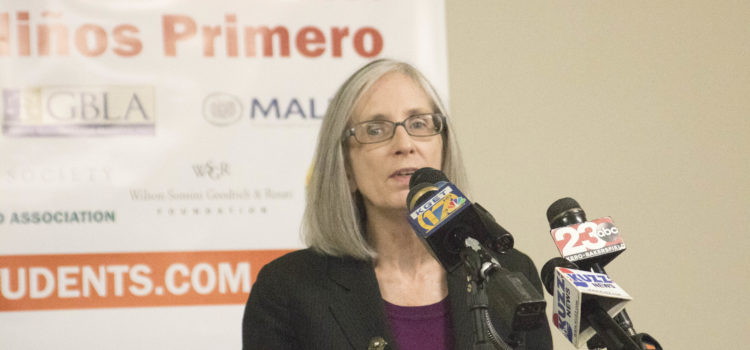
South Kern Sol, Michael Wafford
The Kern High School District reached a settlement this week with 20 plaintiffs in a 204 lawsuit that alleged the district disproportionately disciplined students of color.
In 2009-2010, African American and Latino students in the Kern High School District were being expelled at rates of 400 to 500 percent higher than their white peers Eva Patterson, president of the Equal Justice Society, said Thursday at a press conference. She was joined by several other community organizations involved in the suit, including California Rural Legal Assistance, Faith in Kern, the Dolores Huerta Foundation, and the Mexican American Legal Defense and Education Fund.
The school district’s expulsion and suspension rates were the highest in the state, outdoing districts in larger metropolitan areas such as San Francisco and Los Angeles.
The district began using voluntary and involuntary transfers to move students from mainstream schools to alternative schools that often lacked the same educational and extracurricular activities available to other students, said Kip Hustace, an attorney with MALDEF.
As part of the settlement, the Kern High School District has agreed to implement mandatory training for teachers and staff, including security and police, on cultural competency, implicit bias, racial anxiety, positive behavioral intervention support and other ways to reduce racial discrimination in the district beginning in the 2017-2018 school year.
“This is about moving forward from a place we’ve been for 10 years,” said Cynthia Rice, a member of California Rural Legal Assistance’s litigation team.
The district will also begin posting public reports about their progress with alternative discipline practices, as well as data on school discipline rates, school survey results and on employee training.
To increase transparency and parent-student involvement, the Kern High School District agreed to hold two public forums per year to get feedback on their implementation of practices related to student discipline.
While the settlement was reached, advocates at the press conference stressed that the public must remain vigilant to make sure the KHSD follows through with implementation of the plan.
“I think many people in the district aren’t racist,” Patterson said. “But from what we’ve heard — some pretty terrible things — there are some people with real profound racial issues in the district.”
Dolores Huerta and Joey Williams, chapter director of Faith in Kern, both said they felt a more systemic prejudice from the KHSD environment.
“One of the current school board members once said that with those kids in Arvin and Lamont, their parents don’t want them to go to college. They want them to work in the fields or the oil fields,” Huerta said.
Williams described the KHSD as a part of the school-to-prison pipeline designed to keep brown, black and poor white students from progressing through education.
Fatima Siordia, a senior at Foothill High School, said she has heard teachers with opinions she felt were inappropriate for a school setting.
“I remember hearing a teacher say, ‘If you were Latino and your parents didn’t go to school, you would end up just like them, with no education, you wouldn’t be successful,’” Sirodia said. “I felt like, Why would you ever say something like that? You’re hear to motivate us [students] and want us to succeed.”
As the first settlement of its type, Huerta said, she hopes the settlement will send a message to other schools in the state, especially those in the Central Valley. The student plaintiffs will also receive a portion of the settlement to make up for lost educational opportunities they experienced while expelled or transferred by the KHSD.
“Hopefully it will change people’s minds, but we all know there will always be those people. Hopefully this [settlement] can help change their minds,” Siordia said.